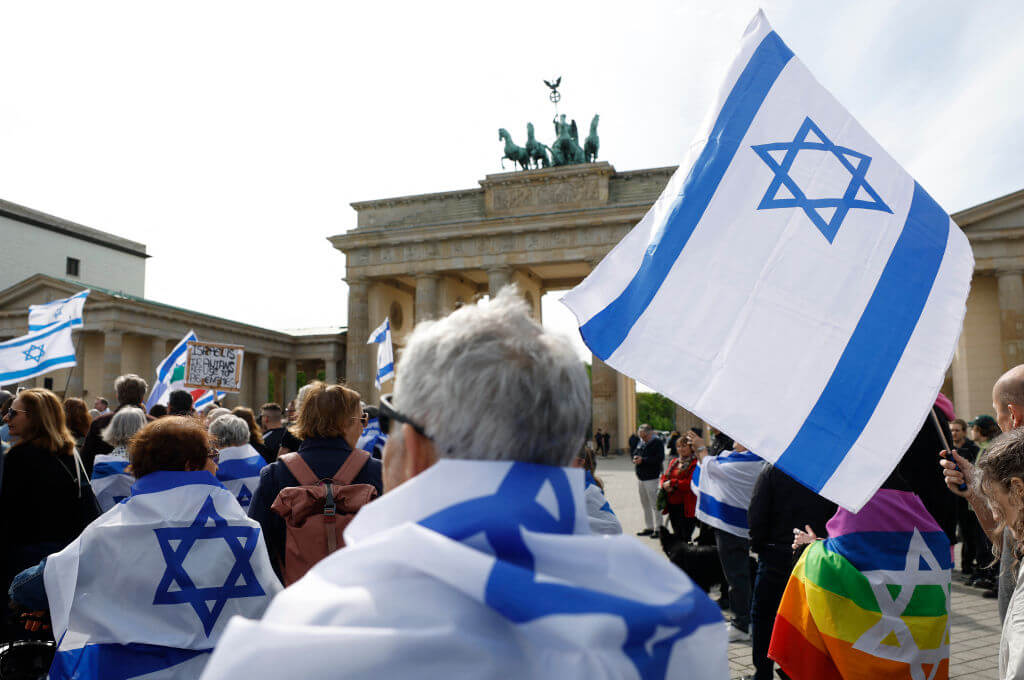Trump Is Right: Jerusalem Is Israel’s Capital. Now Let’s Divide It.

Image by Getty Images
President Trump’s recognition of Jerusalem as the capital of Israel last week was met with a predictably mixed response. There was celebration across the political spectrum in Israel, protests among Palestinians and the rest of the Middle East and reactions ranging from concern to opposition throughout much of the rest of the world.
But far too much significance is being given to the president’s announcement. Jerusalem has been Israel’s capital since before 1967 and all three branches of the Israeli government sit there. And, while Israelis should be happy that they are no longer treated differently than the rest of the world in that their chosen capital city is now recognized by the United States, the Arab world should rest assured that the President never recognized Jerusalem as Israel’s undivided capital. Instead, he was merely acknowledging the facts on the ground.
The President pointed out that the final status of the city should be for the parties to work out, which has many wondering, what is Israel’s ultimate plan for the city?
Most Israeli Jews (and many American Jews for that matter) cannot bear the thought of dividing the city ever again. Indeed, the opposition to dividing Jerusalem is not unique to the Israeli Right. The leaders of Israel’s Centrist parties, Yair Lapid and Moshe Kahlon, have both voiced opposition to the division of Jerusalem and even Avi Gabbay, chairman of the left-wing Labor Party, recently said Jerusalem should remain united under Israel’s sovereignty.
For those opposed to any territorial concessions to the Palestinians, like those on the more extreme Right, it is understandable that dividing Jerusalem would be an emotional issue; it is consistent with their ideology. But many in the mainstream, the moderate Right, and pretty much everyone to their left have accepted the basic premise of land for peace. Indeed, even Prime Minister Benjamin Netanyahu has accepted the concept of a two state solution, at least in theory.
So, it’s strange that despite the willingness to part with the ideal of Greater Israel, almost everyone is adamant that Jerusalem must remain united for some reason. Forget for a moment that such a position will likely never lead to a bilateral peace agreement with the Palestinians. Why is there an added attachment to the majority of Arab East Jerusalem?
The opposition to parting with the portions of Jerusalem which have significance to the Jewish people beyond being part of Greater Israel, such as the Temple Mount and the Mount of Olives, is understandable. But geographically, Jerusalem is a lot more than that. How many of those vehemently opposed to the division of Jerusalem have ever heard of Wadi al-Joz, Jabel Mukaber, Sheikh Jarrakh or Umm Tuba, much less have been there? If the Right is okay with the division of the Land, as it has indeed stated, why should the Arab neighborhoods in East Jerusalem not be included in this division? There is no reason for the vast majority of the Arab neighborhoods in East Jerusalem to have any more significance to Jews than Ramallah or Tulkarem merely because in 1967 someone arbitrarily decided these neighborhoods are part of Jerusalem.
As for the parts of East Jerusalem which have added significance for Jews such as the Temple Mount, the Israelis should absolutely remain steadfast in their connection to the site, and the Palestinians must acknowledge its religious and historical significance to the Jewish People. This obviously presents a significant hurdle in any potential negotiation, but if Israel is willing to concede the vast majority of the Arab neighborhoods in East Jerusalem, the chances of finding common ground or a creative solution for such areas are likelier.
Furthermore, the Arabs living in Jerusalem overwhelmingly identify as Palestinian. Despite having the ability to obtain Israeli citizenship, almost all of them have declined it. Why hold on to these neighborhoods against the will of their inhabitants?
It is also in Israel’s best interest to separate from them. Retaining these neighborhoods does not enhance the Jewish nature of the city and certainly does not contribute to its financial stability. While there have been recent efforts in the Knesset to enlarge Jerusalem’s municipal borders to enhance the Jewish character of the city, doing so merely increases the percentage of Jews in the city and does not help Israel deal with the significant financial and security burden of holding onto the entire eastern portion of the city, nor does it provide any satisfaction for its Palestinian residents.
If, as the majority of Israelis and Palestinians believe, it is best for Israel to separate itself from the Palestinians (preferably through a comprehensive bilateral treaty accepted by all Palestinians), it is best for Israel to re-divide Jerusalem.
Recently, however, there have been cracks in the resistance to dividing Jerusalem on the Right. Yisrael Beiteinu party leader Avigdor Liberman has long expressed support for a plan to redraw the borders of both Israel and the West Bank along ethnic lines.
Likewise, according to a recent report in Al-Monitor, earlier this year Netanyahu tasked Likud Knesset Member Anat Berko (a right-wing stalwart) with drawing up a proposal for dividing Jerusalem. Her plan would place over 90% of the city’s Palestinian residents in a separate municipality which would be transferred over to the Palestinian Authority. This is certainly a good start, but her plan to divide the city created an uproar of opposition among Likud members.
While it will be difficult for the party which made a “united Jerusalem forever” a centerpiece of its policy for so many years to radically change, doing so will benefit all the residents of Jerusalem and the country as a whole.
Of course, as with any plan, Israel’s security interests must be paramount in its planning and implementation and, obviously, there is much more that needs to be done, particularly on the Palestinian side if peace is ever to be achieved.
But agreeing to divide Jerusalem will help Israel maintain the Jewish character of the city, satisfy Jerusalem’s Palestinian residents and pave the way for the Palestinians to have a capital city in East Jerusalem should they ever find a way to ensure Israel’s security needs, unite all their factions and actually agree to sign a deal.
Benyamin Moalem is a former foreign law clerk to the deputy Chief Justice of the Supreme Court of Israel and a Chicago-based attorney.

I hope you appreciated this article. Before you go, I’d like to ask you to please support the Forward’s award-winning journalism this Passover.
In this age of misinformation, our work is needed like never before. We report on the news that matters most to American Jews, driven by truth, not ideology.
At a time when newsrooms are closing or cutting back, the Forward has removed its paywall. That means for the first time in our 126-year history, Forward journalism is free to everyone, everywhere. With an ongoing war, rising antisemitism, and a flood of disinformation that may affect the upcoming election, we believe that free and open access to Jewish journalism is imperative.
Readers like you make it all possible. Right now, we’re in the middle of our Passover Pledge Drive and we need 500 people to step up and make a gift to sustain our trustworthy, independent journalism.
Make a gift of any size and become a Forward member today. You’ll support our mission to tell the American Jewish story fully and fairly.
— Rachel Fishman Feddersen, Publisher and CEO
Join our mission to tell the Jewish story fully and fairly.
Our Goal: 500 gifts during our Passover Pledge Drive!























